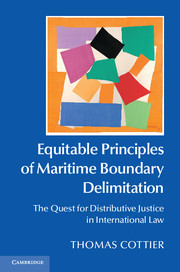 Equitable Principles of Maritime Boundary Delimitation
Equitable Principles of Maritime Boundary Delimitation Book contents
- Frontmatter
- Dedication
- Contents
- List of tables
- List of maps
- Preface
- Acknowledgements
- Table of cases
- Table of treaties and instruments
- Equity revisited: an introduction
- PART I Context: the enclosure of the seas
- PART II The new boundaries
- 4 Approaches to delimitation
- 5 State practice
- 6 Judicial and conciliatory settlements
- 7 An assessment of customary law
- PART III Delimitation based on equity
- Appendix I Maritime boundary agreements 1942–1992
- Appendix II General maps
- Bibliography
- Index
7 - An assessment of customary law
from PART II - The new boundaries
Published online by Cambridge University Press: 05 May 2015
- Frontmatter
- Dedication
- Contents
- List of tables
- List of maps
- Preface
- Acknowledgements
- Table of cases
- Table of treaties and instruments
- Equity revisited: an introduction
- PART I Context: the enclosure of the seas
- PART II The new boundaries
- 4 Approaches to delimitation
- 5 State practice
- 6 Judicial and conciliatory settlements
- 7 An assessment of customary law
- PART III Delimitation based on equity
- Appendix I Maritime boundary agreements 1942–1992
- Appendix II General maps
- Bibliography
- Index
Summary
The review of negotiations at UNCLOS III on maritime boundary delimitation and the factual analysis of state practice and of the case law in the preceding chapters allows for a number of conclusions. They relate to the legal nature of bilateral settlements, the different methods of delimitation of boundaries and the legal approaches to customary and general public international law. The analysis of state practice also allows for a combined assessment of the practical implications of the methods of delimitation and in particular that of equidistance. The analysis is of importance with a view to determining, in subsequent chapters, the role and impact of equity as a principle of law and foundation of maritime boundary law. This chapter discusses to what extent rules relating to maritime boundary delimitation and co-operation can be found in customary law. It finds that there is little evidence to this effect. Normative concepts outside of treaty law will need to be found elsewhere.
The state of play in customary law
The law of the sea has always played a significant role in the process of the formation of customary international law and the shaping of criteria for the assessment of customary rules as distinct from mere usage. Fundamental principles of the freedom of the sea and navigation were established in customary law and remain of some importance, despite subsequent codification in agreements. UNCLOS III today is recognized to a large extent as customary law. The same holds true for the enclosure of the seas. Indeed, the evolution of the legal concepts of the continental shelf and the EEZ rank among the most prominent examples of recent developments in customary international law. They emerged in a close interrelationship with multilateral treaty-making at UNCLOS II and III and a series of court cases relating to maritime boundary delimitation described in Chapter 6. The findings will also be of importance to other issues of allocation of natural resources and distributive justice in public international law.
- Type
- Chapter
- Information
- Equitable Principles of Maritime Boundary DelimitationThe Quest for Distributive Justice in International Law, pp. 354 - 372Publisher: Cambridge University PressPrint publication year: 2015


